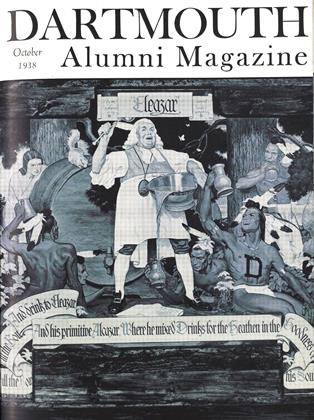APPRECIATION OF HIS DISTINCTION IN CHARACTER, KNOWLEDGE, AND WISDOM
CHARLES DARWIN ADAMS died in New Milford, Connecticut, on May 28, 1938. For nearly half of his long life he was associated with Dartmouth College, first as undergraduate from 1873 to 1877 and later as Lawrence Professor of Greek from 1893 until his retirement in 1927. He studied at the Andover Theological Seminary and was ordained as a Congregational minister in 1885. His life was devoted to study, teaching, and research. After teaching school at Morrisville, Vermont, and in Cushing Academy, Massachusetts, he became professor of Greek in Drurv College, Springfield, Missouri. During the year 1890-1891 he studied at the University of Kiel, Germany, under Friedrich Blass, the foremost modern authority on Greek oratory. At the conclusion of this year at Kiel he received the degree of Doctor of Philosophy.
His published works include an edition of selected orations of Lysias, a translation of the orations of Aeschines, a monograph on Demosthenes in the series entitled OurDebt to Greece and Rome, and numerous articles on Greek literature in the learned journals. His latest contribution to classical scholarship appeared only a month before his death, in the April number of Classical Philology. His publications are characterized by breadth of knowledge, accuracy of statement, and wisdom in the judicious interpretation and presentation of the assembled facts. In his teaching he set high standards in a discipline that was already old when the Christian era began. A man's library may often tell us much of the man himself and this is particularly true in the case of Charles Darwin Adams. His classical books numbering hundreds of volumes and now, incidentally, in the possession of the College, show the same careful judgment, the same selection of the essential and the pertinent things that are characteristic of all his work. There is not a volume in the whole collection that has not abiding value in the study of Greek civilization.
Greek studies, however, did not constitute the whole of his life. He was interested in the work of the Dartmouth Outing Club and was particularly active in the construction of the cabin at Happy Hill. Gardening occupied many of his hours and even this spring one could see him working the soil among his flowers. His devotion to the work of the Christian church lasted throughout his life. The liberality of his religious thinking may best be characterized by a remark made by him many years ago to the present writer, to the effect that there was probably as much of revealed truth in the Dialogues of Plato as in the prophetic books of the Old Testament.
May the integrity of his character and his spirit of tireless search for knowledge and for wisdom remain as part of the precious heritage of Dartmouth College!
 View Full Issue
View Full Issue
More From This Issue
-
 Article
ArticleGradus Ad Parnassum
October 1938 -
 Article
ArticlePublications Control?
October 1938 By C. E. W. -
 Class Notes
Class Notes1921*
October 1938 By CHARLES A. STICKNEY JR. -
 Class Notes
Class Notes1913*
October 1938 By WARDE WILKINS -
 Class Notes
Class Notes1929*
October 1938 By F. WILLIAM ANDES -
 Class Notes
Class Notes1937*
October 1938 By DONALD C. MCKINLAY
Royal Case Nemiah
Article
-
 Article
ArticleTHE OLD ROW FROM A NEW ANGLE
April, 1914 -
 Article
ArticleALUMNI MEMBERS OF THE OUTING CLUB
April, 1922 -
 Article
ArticleTrustees Authorize New Ice Arena-Auditorium
FEBRUARY 1973 -
 Article
ArticleOld President Tucker Returns to Mark a Century of Dartmouth Nights
October 1995 -
 Article
ArticleResponse to a Review
OCTOBER 1971 By ALLAN W. CAMERON '60 -
 Article
ArticleBaseball
June 1962 By DAVE ORR '57




